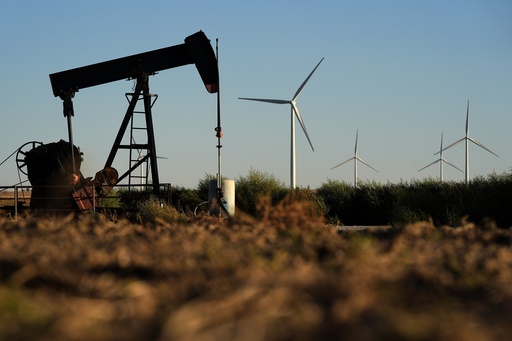Almost 200 countries were tasked with submitting their national strategies for reducing greenhouse gas emissions by Monday, a crucial deadline highlighted by the United Nations’ climate chief, Simon Stiell. These strategic documents, deemed by Stiell as “some of the most significant policy documents governments will generate this century,” outline each nation’s plans to combat climate change.
However, it is anticipated that many countries will miss this deadline. The United Nations has indicated that, as long as nations are actively developing their plans, they are not concerned about missed timelines. To date, only about 12 of the 195 signatory countries to the 2015 Paris climate agreement have submitted their plans regarding emissions cuts targeting the year 2035. This small group accounts for merely 16.2% of global carbon dioxide emissions, predominantly driven by the United States, which has opted out of the plan that the Biden administration previously put forth. Besides the U.S., only three major polluters—Brazil, the United Kingdom, and the United Arab Emirates—have submitted their commitments.
Other countries that have filed include the Marshall Islands, Singapore, Ecuador, Saint Lucia, Andorra, New Zealand, Switzerland, and Uruguay, which collectively contribute less than 0.2% of global CO2 emissions. Stiell noted that over 170 nations have communicated to his office their active engagement in drafting their plans, reinforcing his stance that the focus should be on the quality of these submissions rather than their punctuality.
“Taking a bit more time to ensure these plans are first-rate makes sense,” Stiell remarked during a recent policy address in Brazil. He asserted that these plans will represent the most thorough climate strategies ever constructed. In contrast, Champa Patel, the policy director at the non-profit Climate Group, expressed concern about this approach. “It’s worrying that countries are failing to meet the urgency of the moment,” Patel warned. “The world cannot afford inaction.”
These strategies, known officially as Nationally Determined Contributions (NDCs), serve as the primary vehicle for nations to assert their voluntary commitments to limit or reduce greenhouse gas emissions from fossil fuel combustion. Nations are expected to revise and enhance these contributions every five years, aligning with the Paris Agreement’s ambition to restrict long-term global warming to 1.5 degrees Celsius (2.7 degrees Fahrenheit) above pre-industrial levels. As the planet has already warmed by 1.3 degrees Celsius (2.3 degrees Fahrenheit) since the late 1800s, projections suggest a potential increase of another 1.8 degrees Celsius (3.2 degrees Fahrenheit), according to U.N. assessments.
Climate scientists have indicated that this warming trend has contributed to an increase in severe weather incidents, such as flooding, droughts, hurricanes, and wildfires, all of which result in significant human and financial losses every year. The new NDCs are expected to encompass all greenhouse gases, including methane and nitrous oxide, and should address the entire economy rather than focus solely on the energy sector.
A review by Climate Action Tracker, a collective of scientists analyzing national climate plans, revealed that four out of six reviewed NDCs barely meet the criteria for keeping temperatures under 2 degrees Celsius. Notably, Switzerland was rated as having an inadequate plan, which it noted aligns better with a future warming of 3 degrees Celsius, while the U.K.’s plan is compatible with the 1.5-degree target. The U.K. aims for an 81% emissions reduction by 2035 relative to 1990 levels and is progressing towards phasing out new gasoline and diesel vehicles by 2030. Brazil’s targets include a greenhouse gas reduction of 59% to 67% by 2035 based on 2005 levels, emphasizing climate justice and anti-deforestation measures.
Despite these commitments, many of these countries were rated insufficient upon examination of their actions against their proposals and their “fair share” based on available resources and historical emissions. This includes the United States, which had previously withdrawn from the Paris Agreement under former President Trump. Climate Action Tracker co-founder Niklas Hohne expressed skepticism about the adequacy of global climate efforts, stating, “We know already right now that whatever (other) countries put out, it is not enough. They all need to do more.”
The deadline for submissions, set within the Paris Agreement, is scheduled for 11:59 p.m. in Germany, where the UN climate office is located, nine months before the upcoming international climate conference in Belem, Brazil. Nonetheless, Stiell believes the practical deadline will be in September, when the U.N. will assess all submitted plans to gauge their impact on possible emissions reductions and corresponding limits on future warming.
Significantly, major emitting nations such as the European Union and China are expected to finalize their plans by mid-year, while India intends to submit its targets only after the plans from other key nations are received.




